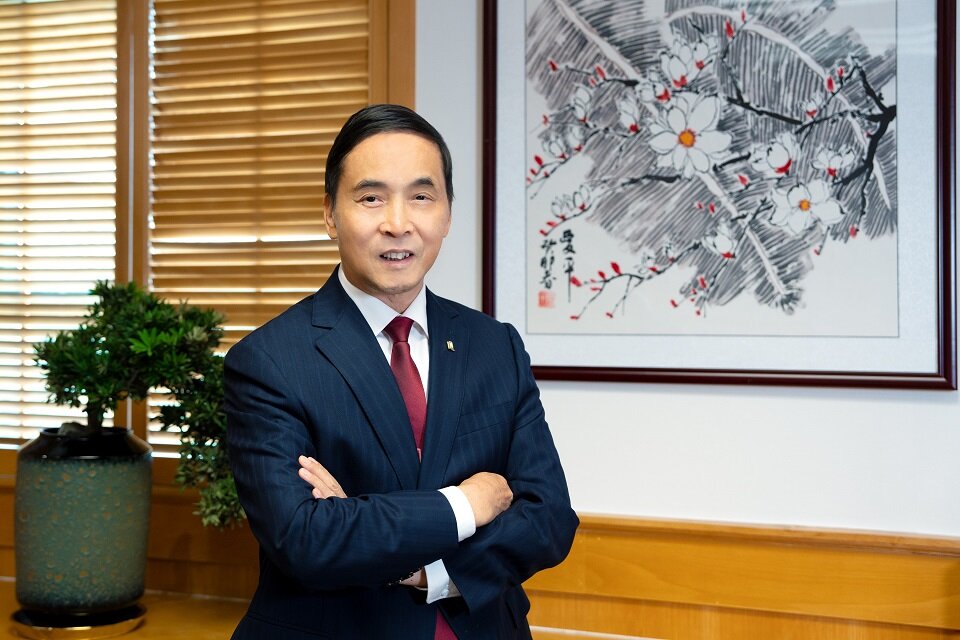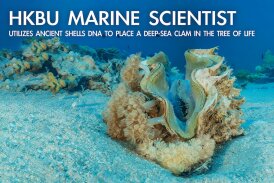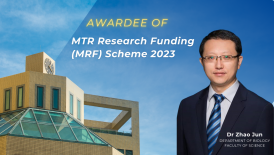
A blueprint for fostering research and innovation

Transdisciplinarity, a new principle of scientific approach that has gained significant attention in the research community, is rapidly becoming popular. At HKBU, researchers from various academic disciplines, such as humanities, social sciences, natural sciences, and life sciences, have been actively collaborating across faculties to develop practical and viable solutions to societal challenges.
Professor Lyu Aiping, the newly appointed Vice-President (Research and Development) and Dean of the Graduate School at HKBU, outlines his goals for fostering transdisciplinary research collaborations and consolidating the University’s position as a catalyst for innovation.
Driving transdisciplinary research
Professor Lyu, who took up his new post in August, is a world-leading scientist in aptamer-based translational medicine and drug discovery, and a leading figure in systems medicine and health sciences, having served as Dean of Chinese Medicine at HKBU for more than a decade. He is not only an accomplished researcher and innovator, but has also been at the forefront of transdisciplinary research, expanding the integration of traditional Chinese medicine with other areas of biomedicine and data science.
As Vice-President (Research and Development), Professor Lyu is responsible for providing the overall leadership and strategic development of the university-wide research agenda for taking the University’s research and development activities to the next level of excellence. He also develops and facilitates direction and scope to promote multidisciplinary and transdisciplinary research, while leading research teams to secure major extramural research projects.
Professor Lyu said research excellence is linked to a transdisciplinary approach to problem solving. “Our traditional disciplines have clear strengths in a number of areas, including Chinese medicine, creative arts, communication and business management, while our academics contribute their expertise in modern science and technology, such as data science, artificial intelligence, and environmental analysis,” he says. By combining our traditional strengths in academic disciplines with our expertise in modern technologies, HKBU will be able to leverage its unique strengths to drive innovation and create new knowledge for the benefit of the community.”
He proposed three key transdisciplinary research areas to address the pressing challenges of the current society and to promote human progress. These include combining Chinese medicine with modern medicine and systems biology to open new pathways for exploration and innovation in future medical development; combining creative arts with artificial intelligence and data science to provide new impetus for artistic creation and development; and combining the humanities and social sciences with contemporary big data analysis technology to create new models for intelligent social development.
Attracting bright minds
Professor Lyu believes that talent is the most valuable resource of the University and the driving force of innovation, so he is committed to creating a supportive environment and a relaxed humanistic atmosphere, so that HKBU researchers can better continue to explore and innovate in the field of knowledge to create our University’s academic high ground.
“Researchers need space to nurture their creativity. We are committed to fostering an open and respectful research culture that encourages and supports our colleagues to pursue innovative research,” he says. “To attract talented early-career researchers, we provide support from the outset in terms of resources, mentorship and training opportunities, to enable them to engage wholeheartedly in research work.”
He emphasises the importance of identifying research strengths within the University in order to establish research groups, and facilitating collaboration among top researchers from different disciplines to conduct impactful and meaningful work.
New changes to HK’s medical landscape
HKBU was awarded the service deed for the operation of Hong Kong’s first Chinese Medicine Hospital (CMH), a development that Professor Lyu believes will play a crucial role in advancing medical progress.
“The new hospital will not only provide high-quality Chinese medicine services to the public, but also take on the responsibility of promoting medical development. Ultimately, this may pave the way for the expansion of the operational model of Chinese medicine services globally,” he says.
Research is the key driver of medical advancements and Professor Lyu is confident that the CMH will provide an excellent platform for the University to conduct clinical research and develop comprehensive disease prevention and treatment strategies. He says: “By identifying problems in clinical practice, seeking potential solutions through scientific research, and conducting clinical trials to evaluate the outcomes of new treatments, we can develop more effective therapies. This, in turn, promotes the internationalisation of Chinese medicine and the future development of the medical field.”
With the trend of collaboration between Chinese and Western medicine, Professor Lyu is optimistic that the CMH will bring promising changes to Hong Kong’s medical landscape and contribute to the improvement of human health.
Passion for Chinese culture
Professor Lyu holds a Bachelor’s degree in Chinese Medicine from Jiangxi University of Traditional Chinese Medicine (now known as Jiangxi University of Chinese Medicine), and a Master’s degree and a PhD degree in Integrative Medicine in Pathology from the China Academy of Traditional Chinese Medicine (now known as the China Academy of Chinese Medical Sciences, CACMS). Prior to joining HKBU, he served as the Executive Director (Legal Representative) of the Institute of Basic Research in Clinical Medicine at CACMS. He was elected as a Foreign Member of the Academia Europaea in 2022 in recognition of his sustained academic excellence in systems medicine.
Beyond his academic pursuits, Professor Lyu has a wide range of interests, including self-taught Chinese calligraphy and landscape photography. He has recently taken up ink painting as a new hobby. He humbly attributes his creative talents to his background in Chinese medicine, saying: “Studying Chinese medicine has given me a deeper understanding of Chinese culture, which has subtly influenced my creative endeavours.”
Previous News
Next News



